Yes, I've been invited back to BBC Radio Coventry & Warwickshire tonight for another chat and to read some of my poems - a live programme again, something which always gets the adrenalin flowing! I was only up there a few weeks ago, so they must have liked me, I guess, or at least nobody complained! I'll be talking to Jane Vickers on the evening show, who's standing in for Anita Miah over the Christmas break.
The earlier weather forecasts were for snow tonight in the Midlands but they seemed to be sheepishly changing their tune on the six o'clock news, claiming that there 'might' be some snow in this area, but nothing like the bad drifts they'll be getting to the east and north of us.
But just in case the car gets stranded, I'm taking my husband with me and we should be back home for about 9.30-10pm, which will hopefully mean we'll miss the worst of the cold -- due to hit from about midnight onwards. Anyone in the Warwickshire area who feels like tuning in tonight, I should be on air from about 8-8.30pmish, maybe a little later. Let me know if you do manage to catch it!
Thursday, December 29, 2005
Wednesday, December 28, 2005
a cold shopping we had of it

Cold again this morning and more snow forecast. I had to drive into Rugby to buy copier paper - what we used to call 'typing paper'! - and sink into a latte whilst reading more Modern Women Poets; the journey was difficult but not impossible, the parking a nightmare as always at this time of year. Snow is beautiful, of course, but only for short periods. Here comes my anxiety attack again, continuing pollution of the atmosphere, land of the eternal snowscape, Mini Ice Age on the way ...
Tuesday, December 27, 2005
Deryn Rees-Jones’ MODERN WOMEN POETS: Mina Loy and the structure of poetry
I’ve been reading my way voraciously through Deryn Rees-Jones’ recent anthology of MODERN WOMEN POETS (Bloodaxe 2005) and making some fascinating discoveries about the history of women’s poetry over the last century. I would very much like to read the companion volume, CONSORTING WITH ANGELS: ESSAYS ON MODERN WOMEN POETS, also by Deryn Rees-Jones, but have only just ordered it from Bloodaxe and so will have to be content with the tantalisingly brief introductions to each poet in this anthology until it arrives.
The experimental poet Mina Loy (1882 - 1996) was born in London but later became a US citizen; the only two collections published during her lifetime were Lunar Baedecker (1923) and Lunar Baedecker & Time-tables (1958). Some of her comments on writing poetry - from an essay entitled ‘Modern Poetry’ quoted in the anthology’s introduction to her work - seem extremely astute and worth repeating here: 'The structure of all poetry is the movement that an active individuality makes in expressing itself. Poetic rhythm ... is the chart of a temperament.'
(Lost Lunar Baedeker, p. 157 - pub. posthumously in 1996/7.)
This makes supreme sense to me, for how else could poetry be constructed, except by way of reference to the self? Even the rules of formal verse are interpreted a different way by each practitioner. Free verse, by contrast, which has gradually become the standard in modern poetry since Loy herself first began writing at the turn of the century, has no precise set of rules, no absolute requirements before it can be called ‘poetry’. So how does the poet go about choosing a form in the face of such apparently unregulated freedom, unless he or she starts by looking within?
Mina Loy says - specifically to women writers in her ‘Feminist Manifesto’ - ‘Leave off looking to men to find out what you are not - seek within yourself to find out what you are.’
(Lost Lunar Baedeker, pp. 153-54)
Wise - if problematic - advice to women poets, now as then; we may well win praise and prizes for writing in a male idiom, but there’s too often an emptiness to the echo, a lack of self-investment in the work which eventually betrays it. How many male poets write like women? And what would we think of their work if they did? (I can hear the machine-guns being trundled out along the wall even as I write that ... )
Poetry may be ‘heightened speech’ but it is still very much an individual’s speech, the voice of that particular poet, not anyone else's. With that individuality comes eccentricity of theme and word selection; highly characteristic variations in line length; breaking the line at a certain word when another poet might have chosen to break after the following word, or perhaps the preceding one; choosing a particular title, or a number instead of a title, or no title at all; writing a prose-like narrative poem, or an elliptical modernist connotation of language and sound, or something more in the style of self-referential epigrammatic postmodernism.
In other words, we are all the sum of our parts, a combination of individual quirks, influences and past experiences, and blessed with a desire to experiment or consolidate, according to our nature as human beings. And that sum total - or as Mina Loy puts it, our ‘temperament’ - informs our every decision, from which hand is dominant to where we break the line in a poem.
For a comprehensive website devoted to this experimental modernist poet, featuring extracts from Mina Loy's poetry and writings, contemporaneous art and poetry that inspired her, and some unusual photographs - there was more than a streak of Victorian decadence in Ms Loy - visit this page first and then the home page of Jenifer Wolkowski's Mina Loy Website .
The experimental poet Mina Loy (1882 - 1996) was born in London but later became a US citizen; the only two collections published during her lifetime were Lunar Baedecker (1923) and Lunar Baedecker & Time-tables (1958). Some of her comments on writing poetry - from an essay entitled ‘Modern Poetry’ quoted in the anthology’s introduction to her work - seem extremely astute and worth repeating here: 'The structure of all poetry is the movement that an active individuality makes in expressing itself. Poetic rhythm ... is the chart of a temperament.'
(Lost Lunar Baedeker, p. 157 - pub. posthumously in 1996/7.)
This makes supreme sense to me, for how else could poetry be constructed, except by way of reference to the self? Even the rules of formal verse are interpreted a different way by each practitioner. Free verse, by contrast, which has gradually become the standard in modern poetry since Loy herself first began writing at the turn of the century, has no precise set of rules, no absolute requirements before it can be called ‘poetry’. So how does the poet go about choosing a form in the face of such apparently unregulated freedom, unless he or she starts by looking within?
Mina Loy says - specifically to women writers in her ‘Feminist Manifesto’ - ‘Leave off looking to men to find out what you are not - seek within yourself to find out what you are.’
(Lost Lunar Baedeker, pp. 153-54)
Wise - if problematic - advice to women poets, now as then; we may well win praise and prizes for writing in a male idiom, but there’s too often an emptiness to the echo, a lack of self-investment in the work which eventually betrays it. How many male poets write like women? And what would we think of their work if they did? (I can hear the machine-guns being trundled out along the wall even as I write that ... )
Poetry may be ‘heightened speech’ but it is still very much an individual’s speech, the voice of that particular poet, not anyone else's. With that individuality comes eccentricity of theme and word selection; highly characteristic variations in line length; breaking the line at a certain word when another poet might have chosen to break after the following word, or perhaps the preceding one; choosing a particular title, or a number instead of a title, or no title at all; writing a prose-like narrative poem, or an elliptical modernist connotation of language and sound, or something more in the style of self-referential epigrammatic postmodernism.
In other words, we are all the sum of our parts, a combination of individual quirks, influences and past experiences, and blessed with a desire to experiment or consolidate, according to our nature as human beings. And that sum total - or as Mina Loy puts it, our ‘temperament’ - informs our every decision, from which hand is dominant to where we break the line in a poem.
For a comprehensive website devoted to this experimental modernist poet, featuring extracts from Mina Loy's poetry and writings, contemporaneous art and poetry that inspired her, and some unusual photographs - there was more than a streak of Victorian decadence in Ms Loy - visit this page first and then the home page of Jenifer Wolkowski's Mina Loy Website .
Sunday, December 25, 2005
Friday, December 23, 2005
writing poetry
My apologies to those of you who periodically drop by, since I've been remiss in my posting for a few days. But it's good news, folks. I've been writing instead; writing poetry, that is, rather than prose, my more usual poison these past few years.
I started writing poems again after a long and difficult hiatus about two years ago, just after the birth of my fifth child, and although it was only a poem or so a month at that stage, it's now begun to snowball; poems are coming thick and fast, sometimes several a day, though of course not all are successful. But at least I have a far better idea these days of the sort of poetry I want to write and should be writing.
When I was writing this rapidly before, in the late nineties when I was putting my first collection together, and also in the year or so immediately following its publication, when four or five poems a day was not unusual, the ratio of throw-outs to must-keeps was much higher. Now I feel early on in a poem that it's not happening and either kill the whole thing without continuing, or write up what I've got and mark it as 'unfinished', just in case I want to work on it again later. And the standard of the poems I do finish is much higher. This is a blessed relief, believe me, because for some years after my first collection came out I was not able to put pen to paper at all - not to write poetry, that is. Hard to explain why, but I started suffering from a sort of poetaphobia. (Probably the wrong word - fear of poets rather than poetry itself! - but you get the general idea.) It sounds ridiculous now, but just the mention of poetry would make my palms sweat. I do still get nervous about poetry on occasion, for one reason or another, but not actually when I sit down to write!
So I'm extremely pleased to be writing again, and so fluently. I just hope it lasts! In the meantime, since I probably won't get a chance to post again before the day itself arrives, please do have a peaceful and merry Christmas, and for those of you who, like me, will be slaving over a vast family turkey and all the trimmings etc. on Christmas Day, do remember to enjoy yourselves ...
I started writing poems again after a long and difficult hiatus about two years ago, just after the birth of my fifth child, and although it was only a poem or so a month at that stage, it's now begun to snowball; poems are coming thick and fast, sometimes several a day, though of course not all are successful. But at least I have a far better idea these days of the sort of poetry I want to write and should be writing.
When I was writing this rapidly before, in the late nineties when I was putting my first collection together, and also in the year or so immediately following its publication, when four or five poems a day was not unusual, the ratio of throw-outs to must-keeps was much higher. Now I feel early on in a poem that it's not happening and either kill the whole thing without continuing, or write up what I've got and mark it as 'unfinished', just in case I want to work on it again later. And the standard of the poems I do finish is much higher. This is a blessed relief, believe me, because for some years after my first collection came out I was not able to put pen to paper at all - not to write poetry, that is. Hard to explain why, but I started suffering from a sort of poetaphobia. (Probably the wrong word - fear of poets rather than poetry itself! - but you get the general idea.) It sounds ridiculous now, but just the mention of poetry would make my palms sweat. I do still get nervous about poetry on occasion, for one reason or another, but not actually when I sit down to write!
So I'm extremely pleased to be writing again, and so fluently. I just hope it lasts! In the meantime, since I probably won't get a chance to post again before the day itself arrives, please do have a peaceful and merry Christmas, and for those of you who, like me, will be slaving over a vast family turkey and all the trimmings etc. on Christmas Day, do remember to enjoy yourselves ...
Monday, December 19, 2005
on angels and muscular poetry
Several days have passed since I last updated my blog ... and no surprise there, with Christmas-a-coming and five kids in the house! I was also struck down by one of these mystery bugs over the weekend and ended up sweating it out under a duvet on the sofa. Shades of being ten years old again and being allowed to watch telly for hours. Except now it’s the DVD collection of ANGEL I’m watching.
I only discovered BUFFY a couple of years back, having married a serious sci-fi/fantasy/horror fan, and now I have the pleasure of steadily watching my way through both BUFFY and ANGEL on DVD, courtesy of the incredibly good value home rental system on amazon. I find both highly entertaining. Especially when laid low and in desperate need of some eye-candy, as the Americans would put it. I’m referring, of course, to the sultry David Boreanaz, who plays Angel, the vampire with a soul.
So, I did my Fourcast reading at the Poetry Cafe last week and it went very well. I was nervous up until the last minute, then found it easy to slide back into performance mode. The poems I read were all new, i.e. uncollected, and some were so new they haven’t yet found their way into any magazines. I was very impressed by Martina Evans, Kevin Higgins and Jacob Sam-La Rose, the other poets reading with me that night, and it was good to see Roddy Lumsden again, who was hosting the event.
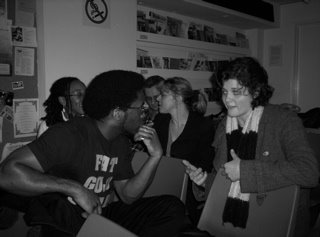
Jacob Sam-La Rose
My thanks to my husband Steve, who stoutly accompanied me down to London even though it meant he didn’t get to bed until nearly 3am and then had to get up for work again at 7am, and to my oldest and dearest friend Judy Ewart, who bought my train ticket, bless her, sat through the reading and then did something almost unheard-of at such events, and actually bought books by the other poets there. With hard cash!
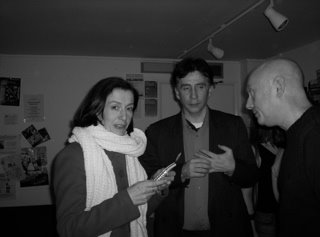
Martina Evans and Kevin Higgins (first from the left)
Yes, it was an enjoyable and fruitful evening; I’ve found that reading poems to an audience is essential for testing them on the air. Otherwise you’re only hearing the poems inside the space of your own head, or as a private exchange between yourself and maybe your partner or husband or cat, whoever happens to be listening when you first try them aloud, and it can be harder to spot glitches in the rhythm or words which don’t fit as perfectly as they should. So it was a useful exercise and I did take away some thoughts on possible structural changes to the more recent poems. I also noted which poems seemed to ‘grip’ the audience more than others.
To my mind, no sin in a writer is greater than that of boring the reader/listener. So it’s a relief to find a poem within your repertoire that, like a good and trusted friend, can be relied upon in almost all circumstances; a muscular sort of poem with broad shoulders and, even better, deep pockets.
I only discovered BUFFY a couple of years back, having married a serious sci-fi/fantasy/horror fan, and now I have the pleasure of steadily watching my way through both BUFFY and ANGEL on DVD, courtesy of the incredibly good value home rental system on amazon. I find both highly entertaining. Especially when laid low and in desperate need of some eye-candy, as the Americans would put it. I’m referring, of course, to the sultry David Boreanaz, who plays Angel, the vampire with a soul.
So, I did my Fourcast reading at the Poetry Cafe last week and it went very well. I was nervous up until the last minute, then found it easy to slide back into performance mode. The poems I read were all new, i.e. uncollected, and some were so new they haven’t yet found their way into any magazines. I was very impressed by Martina Evans, Kevin Higgins and Jacob Sam-La Rose, the other poets reading with me that night, and it was good to see Roddy Lumsden again, who was hosting the event.

Jacob Sam-La Rose
My thanks to my husband Steve, who stoutly accompanied me down to London even though it meant he didn’t get to bed until nearly 3am and then had to get up for work again at 7am, and to my oldest and dearest friend Judy Ewart, who bought my train ticket, bless her, sat through the reading and then did something almost unheard-of at such events, and actually bought books by the other poets there. With hard cash!

Martina Evans and Kevin Higgins (first from the left)
Yes, it was an enjoyable and fruitful evening; I’ve found that reading poems to an audience is essential for testing them on the air. Otherwise you’re only hearing the poems inside the space of your own head, or as a private exchange between yourself and maybe your partner or husband or cat, whoever happens to be listening when you first try them aloud, and it can be harder to spot glitches in the rhythm or words which don’t fit as perfectly as they should. So it was a useful exercise and I did take away some thoughts on possible structural changes to the more recent poems. I also noted which poems seemed to ‘grip’ the audience more than others.
To my mind, no sin in a writer is greater than that of boring the reader/listener. So it’s a relief to find a poem within your repertoire that, like a good and trusted friend, can be relied upon in almost all circumstances; a muscular sort of poem with broad shoulders and, even better, deep pockets.
Tuesday, December 13, 2005
Poetry Cafe reading this Thursday at 8pm
This is just a reminder that I'll be reading in London this Thursday from 8pm, at the Poetry Cafe, 22 Betterton Street, near Covent Garden.
Poets also on the 'menu' that evening will be Martina Evans, Jacob Sam-La Rose and Kevin Higgins. It's a fiver to get in, £4 concessions, with Roddy Lumsden hosting the event.
Poets also on the 'menu' that evening will be Martina Evans, Jacob Sam-La Rose and Kevin Higgins. It's a fiver to get in, £4 concessions, with Roddy Lumsden hosting the event.
Sunday, December 11, 2005
'Ratified': a poetry collection from the author of 'The Ropemaker's Daughter'
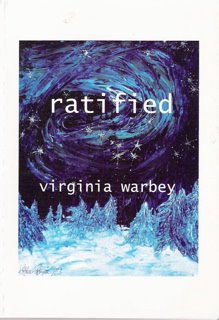
'The Alchemy of the Unexpected'
Novelist, poet and librarian Virginia Warbey died tragically young in a car crash in June 2004. Probably her best-known works are still her novels; The Ropemaker’s Daughter and The Carradine Diary, both published by Diva under her married name Virginia Smith, now modern classics of lesbian literary fiction. But a second collection of her poetry, entitled RATIFIED, has been published posthumously and when it came into my possession at the recent Torbay Poetry Festival, it took only a quick glance through its 80-odd pages to leave me determined to review it.
Poet Vicki Feaver has praised Warbey’s poetry, saying: ‘These are poems ... with a distinct voice and style: love poems that reinvent the love poem, ‘make it new’, as is the gifted poet’s task.’ I agree with this, and would add that it is Warbey’s ability to achieve such an intensely intimate tone in her love poems that makes her best pieces so memorable. One of the strongest instances of this is 'David and Bathsheba', a love poem that sidesteps the obvious problems attached to depicting such a well-known biblical couple, written with a rich attention to detail yet without sentimentality, seen with an artist’s eye and described with a poet’s ear:
'I was lost the first night I saw her,
kneeling at the courtyard pool, her skirts
gathered about her waist,
cypress oil threading gold across her breasts;
a web of want to hook the heart of a king.
She came when I summoned her.
She lay with me,
and the radiance that spilled into the space
between our bodies
dazzled into dust the yoke of our vacuous pasts'
Displaying an innate ability to ‘close’ a poem succinctly and with an echoing resonance that sticks in the mind long after the book has been closed, Warbey ends the poem:
'for we have tasted God on each other’s lips,
Bathsheba and I, sharp as poison.
We arise each day from a sleep like death,
and drink again.'
This is a collection redolent with such biblical keynotes, either quick passing references - ‘a little Lazarus, unsteady on his feet’, for instance, in a poem about a favourite cat who ran out of lives - or stories lifted whole from the scriptures and lived in, inhabited by the poet until they have been made ‘new’, as Feaver put it, reinvented in Warbey’s own voice and idiom.
'Cedarwood' is written in Joseph’s voice, the young carpenter tormented by the thought of his wife Mary’s pregnancy by another man, as he supposes:
'I watch you through the window as I work.
I watch you at the well and in your father’s house.
You stoop down and your blue skirts crumple against your skin,
sticking to your thighs in the fly-blown heat.
You lift yourself carefully these days.
The cedarwood grows warm beneath
my hands, begins to darken.'
Similarly, 'The Wedding at Cana' is seen through the eyes of a wedding guest, particularly astonished by Jesus’ transformation of the water into wine since he was ‘The man I’d barely noticed. / The one least likely.’ This, Warbey argues, is ‘what it’s like sometimes’ - 'the alchemy of the unexpected’ - where the one least likely to change your life is often the one who is most able to do so.
This note in her poetry, an easy conversational tone which nonetheless manages to maintain rhythm and tension, is what best characterises Warbey’s work. The voices change, may rise and fall, but they remain defiantly poetic, as here in 'Magdalen', where her ideologically provocative opening lines ‘If they tell you that it wasn’t love, / don’t believe them’ strike a colloquial note that are soon followed by the embarrassingly intimate and closely-observed
'I bathed his feet with the scent of tears,
touched my lips to the dust
that lived
in the veins of his ankles'
demonstrating why Virginia Warbey won no fewer than 13 competition prizes for poems in this second collection.
But perhaps that’s where I come to my only reservation about RATIFIED; too many of these pieces do read like competition poems. Well-written, yes, but perhaps a little too well-written and self-conscious to really lift the hairs on the back of the neck. Something deeper always seems to be being held back, smoothed over and planed down, hidden like Joseph’s frustration and jealousy in her poem 'Cedarwood'. Now and then it can be glimpsed, in the turn of a phrase or in a beautifully achieved image, almost ready to emerge but not quite, as though the poet is pacing herself, attempting to master the form that could contain her.
It’s a tragedy, of course, that Virginia Warbey will never be able to develop her work beyond this second collection, to transform herself into the accomplished and award-winning poet I have no doubt she would have become if she had lived. But what we do have in this promising second collection, RATIFIED, is a poetry worth turning to for its richness of imagery, its keen and questioning intelligence, and its strong rhythmic sensitivity; the poignant last snapshot of a talented poet, poised forever on the very brink of initiation.
........
To order a copy of RATIFIED by Virginia Warbey (Merdon Marque, December 2004) the price is £6.95, plus £1.00 UK post & packing. Send orders with cheques, made payable to Chandlers Ford Writers (VW poetry), to Claire Gradidge, 8 Forest Road, Hants, SO53 1LZ.
Alternatively, you can order online at amazon.co.uk
Wednesday, December 07, 2005
fine beards on display at the Night Blue Fruit poetry spot
It was the monthly Night Blue Fruit live poetry event last night and there was a packed house at the Tin Angel in Coventry. Pleasantly attended in the first half, elbow room only by the second half. Perhaps news had gone round that I was reading early. Jon Morley of the Heaventree Press kicked off the evening by reading a lively extract from David Dabydeen’s novel Our Lady of Demerara.
Hindu believe when you die you come back as ant, like me muma, or toucan like me dadee, or maybe a prince, a pandit, a pork-knocker, depending on whether Lord Krishna, who rule the universe, vex with you or content…
Heaventree Press published an extract from this novel in pamphlet form last year (entitled Jungle and available for £3.99 both from Heaventree Press itself and from Amazon).
Then we heard from Colin Dick, seen below, whose complex poems, command of the English language and fine Old Testament beard continue to astound and fascinate us all.
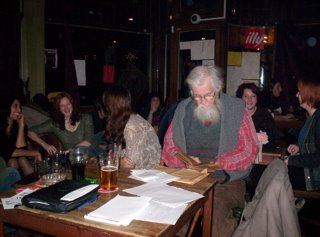
I read a handful of my own poems, talked to some interested parties about a possible Coventry Poetry Festival starting in 2007, and took these rather murky-looking photographs to capture the ambience. This is a young American poet, Deborah Adams, reading her poetry at the Tin Angel for the first time ... it can be a bit of a bear pit, but we took her innocence into consideration and were kind. I decided to post her photograph on here as a sort of odd-one-out situation; i.e. she didn't have a beard.
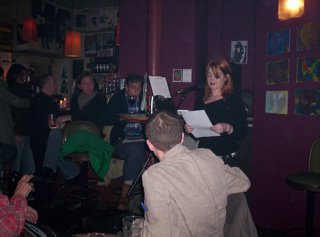
And here’s Barry Patterson, local poet and professional performer, putting in a quick plug for his newly published book, The Art of Conversation with the Genius Loci, which ‘looks at the relationship between our spiritual path and our immediate environment’ in a powerful combination of prose and poetry.
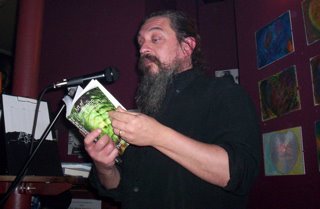
You can get hold of Barry Patterson’s book (£13.95) online from the publisher or by writing to
Capall Bann Publishing
Auton Farm
Milverton
Somerset TA4 1NE
And if all these beards and reading-your-own-poetry-to-an-audience craziness sound too exciting to miss, you can join Night Blue Fruit every month at the fabulous Tin Angel bar in Medieval Spon Street, Coventry, by clicking here for more details. You don't need to have a beard and it’s all free, except for the beer ...
Hindu believe when you die you come back as ant, like me muma, or toucan like me dadee, or maybe a prince, a pandit, a pork-knocker, depending on whether Lord Krishna, who rule the universe, vex with you or content…
Heaventree Press published an extract from this novel in pamphlet form last year (entitled Jungle and available for £3.99 both from Heaventree Press itself and from Amazon).
Then we heard from Colin Dick, seen below, whose complex poems, command of the English language and fine Old Testament beard continue to astound and fascinate us all.

I read a handful of my own poems, talked to some interested parties about a possible Coventry Poetry Festival starting in 2007, and took these rather murky-looking photographs to capture the ambience. This is a young American poet, Deborah Adams, reading her poetry at the Tin Angel for the first time ... it can be a bit of a bear pit, but we took her innocence into consideration and were kind. I decided to post her photograph on here as a sort of odd-one-out situation; i.e. she didn't have a beard.

And here’s Barry Patterson, local poet and professional performer, putting in a quick plug for his newly published book, The Art of Conversation with the Genius Loci, which ‘looks at the relationship between our spiritual path and our immediate environment’ in a powerful combination of prose and poetry.

You can get hold of Barry Patterson’s book (£13.95) online from the publisher or by writing to
Capall Bann Publishing
Auton Farm
Milverton
Somerset TA4 1NE
And if all these beards and reading-your-own-poetry-to-an-audience craziness sound too exciting to miss, you can join Night Blue Fruit every month at the fabulous Tin Angel bar in Medieval Spon Street, Coventry, by clicking here for more details. You don't need to have a beard and it’s all free, except for the beer ...
Sunday, December 04, 2005
Night Blue Fruit at the Tin Angel, 6th December
For those living in the Midlands, the next Night Blue Fruit live poetry event will be held this Tuesday, 6th December, at the highly atmospheric Tin Angel in Medieval Spon Street, Coventry. Hosted as always by Jon Morley of the Heaventree Press, the evening tends to kick off at about 8.30pm. Best to turn up a little earlier though to make sure of an open mic slot.
If you’ve never been before, it’s a lively and informal evening in a superb venue, well worth a visit if you’re into live poetry. Listen or join in, it’s entirely up to you. It's free, and there’s a fully licensed bar!
I’ll be at the Tin Angel this month too, reading some new work from 8.30pm onwards. Perhaps trying out some pieces I intend to read in London on Thursday 18th, at the Poetry Society Fourcast gig. And talking to people about the possibility of launching a Coventry Festival.
There seems to be such a strong poetic vibe in Coventry these days, with the Heaventree Press making strides with new and challenging publications, and our live poetry events always so packed out. It feels like time we thought about expanding our horizons and inaugurating an international poetry or literary festival in the city that would attract readers, performers, listeners and writers from all over the world.
If you’ve never been before, it’s a lively and informal evening in a superb venue, well worth a visit if you’re into live poetry. Listen or join in, it’s entirely up to you. It's free, and there’s a fully licensed bar!
I’ll be at the Tin Angel this month too, reading some new work from 8.30pm onwards. Perhaps trying out some pieces I intend to read in London on Thursday 18th, at the Poetry Society Fourcast gig. And talking to people about the possibility of launching a Coventry Festival.
There seems to be such a strong poetic vibe in Coventry these days, with the Heaventree Press making strides with new and challenging publications, and our live poetry events always so packed out. It feels like time we thought about expanding our horizons and inaugurating an international poetry or literary festival in the city that would attract readers, performers, listeners and writers from all over the world.
Wednesday, November 30, 2005
a white Christmas?

I took this last week in the Warwickshire village near my home. Beautiful, isn't it? I almost expected to see the odd duck frozen solid in the pond, maybe just its head sticking out. And then the snow came. For a while it seemed as though my dire warnings of a mini Ice Age were not so far-fetched after all. But the snow began to thaw quite rapidly and is now just a vague iciness clinging to the hedgerows. Well, this is Warwickshire. Not the Orkneys. Though I think the kids would have liked the snow to stick around a little longer.
Quite a few of my posts seem to be about the weather recently. Hmm. It's all very British of me, but perhaps I should try and make my next post about poetry instead. Just to keep up appearances.
Here are my twin sons, three years old, out in the recent snow.
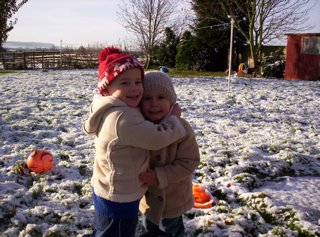
Monday, November 28, 2005
THANATOS: the death-instinct
When I first started this blog, I thought it would be nice to post up some poems from time to time, but never really got around to managing that. But being deeply involved with a new novel at the moment, it seems a quick way of keeping the blog active without having to bare my soul online.
This isn't a new poem but it is one of my personal favourites. I wrote THANATOS in about 1998; it was published a year or so later in PN Review, an intelligent poetry magazine edited by Michael Schmidt of Carcanet Press (PN stands for Poetry Nation). Since my second collection is still forthcoming, it has not yet been published in book form.
It's never easy for a poet to 'explain' a poem they have written, but THANATOS, I suppose, is a poem which likens love to being caught in a cyclone. It's quite different from the poems in my first collection, most notably in terms of form; I'd been reading some of Ted Hughes' later work when I wrote this - his BIRTHDAY LETTERS, in particular - and I was rather taken with the prosiness (which I'm not convinced is a real word) and dramatic tone of that collection.
Thanatos comes from the Greek for death. I think it means something like 'death-instinct' - at least, that's what I took it to mean at the time I wrote this poem. Later, I agreed to medication and am no longer driven to write this sort of grim, self-involved poetry. I'm not sure if that's entirely a good thing. I prefer compulsive poetry to light anecdotal verse, and it's quite hard to write poetry of a compulsive nature when everything's sunny in your life and you're not struggling with some terrible inner demon. Though I imagine there are many poets out there who would - and probably will - disagree with that particular generalisation. Fortunately, I don't care.
THANATOS
Schoolgirl vulnerable, still smarting from
the fumbled mismatch of a love affair, I fell
straight out of space and into hell
that night. He was only a voice
on the edge of nothing, but I kept returning
to him, flickering like a stilled film
against the mindless black ferocity of wind.
The roof was trying to suck me out, vast mouth
clamped like a mad baby’s over the breast
of a house, whining for milk. I wanted
then to loose my hold, know how it feels
to spiral in the infinite, to Catherine-wheel
across the space that once was love.
Thanatos, pricking at my blood: the truth
that I came searching for, a weariness
that threatened to unclasp my hand, saying
it’s over, all over, why resist?
But at the other end of light, the funnelled dark
was a dead body I clung to out of
sheer stubbornness.
And the black wind
could not dislodge me from my welding-place,
though its eye bent in and saw me there,
plucked at my white knuckles, severed
the electric umbilical of light. I took
that place and hid it underneath the other times,
less brutal, more arranged. But it comes back,
obliterates that flash between dark and dawn,
and I pretend not to recognise it; call it
desire for solitude. Expurgate, disown the truth.
This isn't a new poem but it is one of my personal favourites. I wrote THANATOS in about 1998; it was published a year or so later in PN Review, an intelligent poetry magazine edited by Michael Schmidt of Carcanet Press (PN stands for Poetry Nation). Since my second collection is still forthcoming, it has not yet been published in book form.
It's never easy for a poet to 'explain' a poem they have written, but THANATOS, I suppose, is a poem which likens love to being caught in a cyclone. It's quite different from the poems in my first collection, most notably in terms of form; I'd been reading some of Ted Hughes' later work when I wrote this - his BIRTHDAY LETTERS, in particular - and I was rather taken with the prosiness (which I'm not convinced is a real word) and dramatic tone of that collection.
Thanatos comes from the Greek for death. I think it means something like 'death-instinct' - at least, that's what I took it to mean at the time I wrote this poem. Later, I agreed to medication and am no longer driven to write this sort of grim, self-involved poetry. I'm not sure if that's entirely a good thing. I prefer compulsive poetry to light anecdotal verse, and it's quite hard to write poetry of a compulsive nature when everything's sunny in your life and you're not struggling with some terrible inner demon. Though I imagine there are many poets out there who would - and probably will - disagree with that particular generalisation. Fortunately, I don't care.
THANATOS
Schoolgirl vulnerable, still smarting from
the fumbled mismatch of a love affair, I fell
straight out of space and into hell
that night. He was only a voice
on the edge of nothing, but I kept returning
to him, flickering like a stilled film
against the mindless black ferocity of wind.
The roof was trying to suck me out, vast mouth
clamped like a mad baby’s over the breast
of a house, whining for milk. I wanted
then to loose my hold, know how it feels
to spiral in the infinite, to Catherine-wheel
across the space that once was love.
Thanatos, pricking at my blood: the truth
that I came searching for, a weariness
that threatened to unclasp my hand, saying
it’s over, all over, why resist?
But at the other end of light, the funnelled dark
was a dead body I clung to out of
sheer stubbornness.
could not dislodge me from my welding-place,
though its eye bent in and saw me there,
plucked at my white knuckles, severed
the electric umbilical of light. I took
that place and hid it underneath the other times,
less brutal, more arranged. But it comes back,
obliterates that flash between dark and dawn,
and I pretend not to recognise it; call it
desire for solitude. Expurgate, disown the truth.
Tuesday, November 22, 2005
Fourcast: London reading next month
For those in the London area who have never heard me perform and can stomach the thought, I’ll be in the capital next month reading a selection of my new poems, alongside poet and novelist Martina Evans, Salmon Poet Kevin Higgins and Jacob Sam-La Rose, as part of the FourCast series at Covent Garden.
FourCast is a series of poetry readings held each month downstairs at the Poetry Society's headquarters in London, otherwise known as the Poetry Studio, hosted by the Scottish poet & writer Roddy Lumsden. Hope to see you there!
DETAILS:
Venue: Poetry Cafe, 22 Betterton St, Covent Garden, London
Date/Time: Thursday 15th December, 7.30pm
Tickets: £5/£4
FourCast is a series of poetry readings held each month downstairs at the Poetry Society's headquarters in London, otherwise known as the Poetry Studio, hosted by the Scottish poet & writer Roddy Lumsden. Hope to see you there!
DETAILS:
Venue: Poetry Cafe, 22 Betterton St, Covent Garden, London
Date/Time: Thursday 15th December, 7.30pm
Tickets: £5/£4
Friday, November 18, 2005
Aren't men thoughtful?
My husband very kindly took me out to dinner for my birthday treat last night. We went in my car, with him behind the wheel for once so I could legally down a couple of glasses of Chardonnay. When I struggled into the car this morning after some vigorous de-icing - it looked like a wedding cake on wheels - I discovered that I was almost out of petrol. Picture this. It’s the nursery school run. You have three children under four years old in the car and a trip of over 9 miles to the nearest petrol station, with the needle well into the red and the warning light glaring at you the whole way. What joy. Luckily, I just made it, coasting most of the way on fumes. Harumph.
Thursday, November 17, 2005
BBC Radio Coventry and Warwickshire
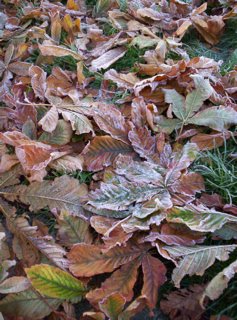
Took this photograph in my back garden at 7.30am this morning, here in frosty Warwickshire, where the surrounding fields were as white as the sheep in them until about 9am when the bright sunshine finally thawed them out.
And it’s my birthday today! Seventeen again. That’s how old I feel when I’m lying down. Standing up is another matter. I got Swiss chocolates, After Eight mints, bubble bath, an electric toothbrush (for use after the chocolates, I suspect) and a new DVD of the 1995 BBC production of Persuasion, which is my favourite among Jane Austen’s novels, superbly cast and directed, starring Amanda Root and Ciaran Hinds with screenplay by Nick Dear. Thanks for that, dear husband and assorted children. And as for the cheque from my aged paternal relative, now residing on the continent, many astonished thanks too. At last I can afford Mark Haddon’s debut poetry collection, whose title is too long to remember and which costs about £12 - published in hardback, I think - which has put it just out of my financial reach until now.
Mmm. I feel a review coming on in the near future ...
This week, I was invited to do a live interview with Anita Miah on BBC Radio Coventry & Warwickshire. I’ve been down to their studios before, they’ve got these amazing new premises in the centre of Coventry, down in Priory Place just below the Cathedral. The whole square there has been superbly revamped; it’s now a sort of Little London tucked away behind the shopping centres and pubs, with some rather expensive-looking wine bars and bistros, outside seating during the summer, a beautiful water feature complete with waterfall and atmospheric night lights, and the BBC building right there at the heart of it. So I left the sheep fields behind last night and drove into Coventry to read some of my poetry and chat about my writing career with Anita Miah. It was a good interview, very relaxed and fun. If you managed to catch any of it, do let me know by leaving a comment on this site.
Continuing with the poetry theme, for those in the London area, the Poetry Society would like to remind everyone about the reading tonight with Tomaz Salamon and Gregor Podlogar at 7.30pm in the Poetry Studio at 22 Betterton Street (Covent Garden tube is closest, I seem to recall). The event will be introduced by Fiona Sampson and Stephen Watts will be one of the English readers of their poems. This is a free event sponsored by the Slovenian government. So there you have it. Free poetry!
Sunday, November 13, 2005
se Googler = to self-Google?
Whilst looking myself up on Google tonight - an occasional ego-trip which always seems to leave me depressed - I stumbled across a link to Martin Blyth's website where anyone who wants a laugh will find an extremely unflattering photograph of me sporting what appears to be a double chin, plus a far more comprehensive account of the recent Torbay Poetry Festival than the one I posted below. I did manage to rub a few words together with Martin while I was in Torquay but somehow we never quite sat down together for a proper conversation about poets and poetry. Next time, perhaps. Meanwhile, I highly recommend his site for a poetry-related cyber jump. Just click Enter once there and follow the site guide to Torbay.
Friday, November 11, 2005
break out the champagne!
At long last, the book I have been writing for nearly a year is finished! Well, more or less finished. The last page has been written but there's still a little fine-tuning to be done before I can shoot it off in the post. Polishing. Editing. Revising. Perhaps the odd name change. That sort of thing. It's a fantasy novel for children, that's as much as I'm prepared to say about it at the moment. But I'm extremely pleased and relieved that it's almost ready to be seen.
Now I can get on with the other novel that's been bugging me for months now, desperate to interfere with the one I've just finished. Almost finished. Still, finished or almost finished, it's definitely time to unwind for a few hours. Glass in one hand, rough draft of a synopsis for my next novel in the other ...
Now I can get on with the other novel that's been bugging me for months now, desperate to interfere with the one I've just finished. Almost finished. Still, finished or almost finished, it's definitely time to unwind for a few hours. Glass in one hand, rough draft of a synopsis for my next novel in the other ...
Monday, November 07, 2005
milk comes frozen home in pail
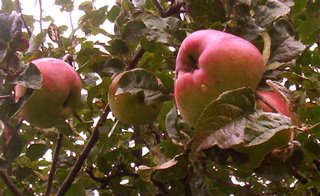
I took this picture some weeks ago in my back garden, here in rural Warwickshire, Shakespeare country, but there are still apples on this tree even now, too high to be picked without a ladder. The squirrels are enjoying them, and a few late wasps. Apples on the trees? Wasps still active in November? It's lovely that the autumn has been so mild here. But I find the unpredictable weather in recent years both mystifying and worrying.
In fact, I've been doing quite a bit of reading on climate change over the past few weeks, mainly because I'm researching a story I want to set in the mid-seventeenth century and have discovered (I had never been aware of this before, to my shame) that we experienced a Little Ice Age for about 150 years, dating from roughly the time of Shakespeare's birth through to the early 1700s. Then I remembered Shakespeare' s 'milk comes frozen home in pail' from Love's Labour's Lost, Act 5. As a child, I always thought this description of winter a little exaggerated; now I realise that the icy winters of the late 16th and 17th centuries would have been a great deal harsher than our own mild frosts, with snow remaining on the ground some years for as long as a hundred days and Ice Fairs held on the Thames throughout the winter:
When icicles hang by the wall
And Dick the shepherd blows his nail
And Tom bears logs into the hall
And milk comes frozen home in pail,
When blood is nipp'd and ways be foul,
Then nightly sings the staring owl: Tu-whit,
Tu-who, a merry note,
While greasy Joan doth keel the pot.
When all aloud the wind doth blow
And coughing drowns the parson's saw
And birds sit brooding in the snow
And Marian's nose looks red and raw,
When roasted crabs hiss in the bowl,
Then nightly sings the staring owl: Tu-whit,
Tu-who, a merry note,
While greasy Joan doth keel the pot.
The problem is, research has shown that if the deep ocean currents that keep our climate stable are eventually overwhelmed and changed by the rapid and ongoing melting of polar ice, another Ice Age could occur within the space of a few short years - not gradually, over a hundred years, as was previously thought. And there's nothing to suggest that it would be as short a cold snap as Shakespeare's Little Ice Age. Some experts believe it could last for hundreds of thousands of years.
Time, perhaps, for us to take global warming and anti-pollution measures seriously. The links I've used here are only the tip of the iceberg; try googling Ice Age and see what you come up with.
Saturday, November 05, 2005
Moira's debate speech at the Torbay Festival 2005
Below is the transcript of Moira Clark's opposing speech in the Torbay Poetry Festival debate 'Is poetry just another form of therapy?' I'm afraid I don't have the transcript of Geoffrey's speech to set against this, but I hope anyone who feels strongly either way will read this post and make their comments below! Moira won the debate -- scroll back a few posts to read my account of the Torbay Poetry Festival itself for further details and photographs. Delivered at the Belgrave Hotel, Torquay, on Saturday October 22nd. The proposer was Geoffrey Godbert IS POETRY JUST ANOTHER FORM OF THERAPY? with opposing speech here below by Moira Clark.

'Poetry is just another form of therapy? I think we have to look at the words in this sentence in order to understand how to address it. Poetry. What is poetry? We could debate this for ever but that’s not the issue here. Let’s look at what poets say about poetry since I’m sure therapists are not the best people to ask. As poets, we all know this quote by Coleridge: 'Poetry; the best words in the best order.' And TS Eliot: 'Genuine poetry can communicate before it is understood.' Emily Dickinson: 'If I feel physically as if the top of my head were taken off, I know that is poetry.' And Christopher Logue (the chap who is trying to translate Homer’s Illiad): 'Poetry cannot be defined, only experienced.' 'Poetry is. A poem should not mean. But be.' Archibald MacLeish.
So poetry is not a way of healing ourselves. It is about the best words in the best order, communication, a physical decapitation and an experience. I have been amazed by the number of poets who say they didn’t find their way to poetry; poetry chose them: Dannie Abse, Maura Dooley. So if it isn’t a matter of choice, what is it? Just another form of therapy?
Just in this context means: at most, merely, no more than, nothing but, only, simply, solely. So it might read: poetry is only another form of therapy. There are no arguments that poetry has been used to help people through crises of mental and physical distress but surely poets are not all depressed, psychotic, or suicidal. But is poetry simply, solely, merely and nothing more than another form of therapy? If that has become a truism, then I am in the wrong business; along with Jo Shapcott who says: 'Poems are for exploration, discovery, transformation. They would be very dull otherwise. The idea of poetry primarily for therapy is pretty pointless.' And Neil Astley, that champion of getting poetry to everyone, says: 'Good poetry doesn’t offer a simple solace or poetic medication; it opens up the senses, it disturbs, questions, challenges.'
So… to therapy. By definition: Therapy is the remedial treatment of illness or disability. So is poetry a cure-all? I don’t think so. How many of you have expected poetry to cure you when you’ve been ill, had a broken leg? When your leg is broken you don’t go to a physiotherapist and ask them how to express your pain and anger at having to sit around the house waiting for your bones to heal. We wouldn’t go for radiation therapy and ask if the writing of a poem would put our cancer into remission. Poets of the First W.W. had to find strategies for dealing with that experience and were the first to articulate the fact that war was not what people at home imagined. Was Wilfred Owen using poetry as a means of therapy – to get him through the war - or was he trying to get across the awfulness of war to those who weren’t experiencing it first hand? In Dulce et Decorum, he writes:
Bent double, like old beggars under sacks,
Knock-kneed, coughing like hags, we cursed through sludge,
Till on the haunting flares we turned our backs
And towards our distant rest began to trudge.
Men marched asleep. Many had lost their boots
But limped on, blood-shod. All went lame; all blind;
Drunk with fatigue; deaf even to the hoots
Of tired, outstripped Five-Nines that dropped behind.
This is not written with therapeutic intent.
If poetry is just another form of therapy does it mean that all poets are continuously trying to heal themselves? That would mean that we poets are a sorry bunch indeed. We are all troubled with deep depression, in constant pain and so we need to write poems to heal ourselves. What bloody nonsense! Undeniably there are poets who have written out of a place of depression, of mental illness but their intention was not primarily one of self therapy but rather to express their experiences – to translate them into poetry. I’m thinking particularly of Anne Sexton, Sylvia Plath and John Berryman.
Kate Foley says: 'Poetry is not a therapeutic process. It isn’t about the healing that can take place in therapy. It’s about selecting, reflecting, ordering, and, if you’re lucky, making art and making sense.' So poetry is about selecting the best words, using them in the best order. It’s about making art: 'Painting is silent poetry, and poetry is painting with the gift of speech,' says Simonides – one of the most prolific poets of ancient Greece. And 'Poetry is the impish attempt to paint the colour of wind': Maxwell Bodenheim.
Surely this is the next step we must take. Poetry isn’t just an outpouring of emotion – it’s a craft, an art. It’s the attempt to ‘paint the colour of wind’. I’d have given up long ago if I could only read confessional poems from depressed, psychotic suicides. I would guess that everyone in this room would have lost interest if all the poetry in the world was about depression, sorrow and woe, woe is me! Maura Dooley says: '…the ‘I’ in a poem is imagined or borrowed not simply me. Like looking at the over-familiar and making it new again, making it strange. Isn’t that always one of poetry’s greatest strengths? It would be boring of me to write about my personal sorrows.'
Yes. Yes. Yes. It would be boring to read about people’s personal sorrows especially if they were using poetry – an art, a craft which opens up the senses, questions, challenges, puts the best words in the best order – as some kind of therapy without addressing the reader or the listener. An outpouring of pain is not poetry. And poetry is not just another form of therapy. It’s so much more. UA Fanthorpe says: 'It’s important to admit your fears. But the most important thing is to survive and you can’t survive if you’re eaten up by terror.' She also says: 'A poem is the conversation between the poet and the reader.' A therapeutic poem would be a one-way thing – not a conversation.
So how can anyone argue that 'poetry is just another form of therapy' when there is so much evidence to suggest it’s far from that? The point of poetry, Paul Muldoon says, is 'to be acutely discomforting, to prod and provoke, to poke us in the eye, to punch us on the nose, to knock us off our feet, to take our breath away.' If Paul Muldoon is right then it’s far from being therapeutic.
Poetry is. Poetry is communication, language, conversation. It disturbs, challenges, questions, explores. It is about making art, making sense. Poetry can attempt to paint the colour of the wind. Poetry can console, uplift, encourage, provide new insights. But, poetry cannot cure. It cannot stop us committing suicide. It cannot put our cancers in remission. It cannot mend a broken leg. Poetry cannot be the remedial treatment of illness or disability. Poetry is not just another form of therapy.'
Moira Clark, October 2005

'Poetry is just another form of therapy? I think we have to look at the words in this sentence in order to understand how to address it. Poetry. What is poetry? We could debate this for ever but that’s not the issue here. Let’s look at what poets say about poetry since I’m sure therapists are not the best people to ask. As poets, we all know this quote by Coleridge: 'Poetry; the best words in the best order.' And TS Eliot: 'Genuine poetry can communicate before it is understood.' Emily Dickinson: 'If I feel physically as if the top of my head were taken off, I know that is poetry.' And Christopher Logue (the chap who is trying to translate Homer’s Illiad): 'Poetry cannot be defined, only experienced.' 'Poetry is. A poem should not mean. But be.' Archibald MacLeish.
So poetry is not a way of healing ourselves. It is about the best words in the best order, communication, a physical decapitation and an experience. I have been amazed by the number of poets who say they didn’t find their way to poetry; poetry chose them: Dannie Abse, Maura Dooley. So if it isn’t a matter of choice, what is it? Just another form of therapy?
Just in this context means: at most, merely, no more than, nothing but, only, simply, solely. So it might read: poetry is only another form of therapy. There are no arguments that poetry has been used to help people through crises of mental and physical distress but surely poets are not all depressed, psychotic, or suicidal. But is poetry simply, solely, merely and nothing more than another form of therapy? If that has become a truism, then I am in the wrong business; along with Jo Shapcott who says: 'Poems are for exploration, discovery, transformation. They would be very dull otherwise. The idea of poetry primarily for therapy is pretty pointless.' And Neil Astley, that champion of getting poetry to everyone, says: 'Good poetry doesn’t offer a simple solace or poetic medication; it opens up the senses, it disturbs, questions, challenges.'
So… to therapy. By definition: Therapy is the remedial treatment of illness or disability. So is poetry a cure-all? I don’t think so. How many of you have expected poetry to cure you when you’ve been ill, had a broken leg? When your leg is broken you don’t go to a physiotherapist and ask them how to express your pain and anger at having to sit around the house waiting for your bones to heal. We wouldn’t go for radiation therapy and ask if the writing of a poem would put our cancer into remission. Poets of the First W.W. had to find strategies for dealing with that experience and were the first to articulate the fact that war was not what people at home imagined. Was Wilfred Owen using poetry as a means of therapy – to get him through the war - or was he trying to get across the awfulness of war to those who weren’t experiencing it first hand? In Dulce et Decorum, he writes:
Bent double, like old beggars under sacks,
Knock-kneed, coughing like hags, we cursed through sludge,
Till on the haunting flares we turned our backs
And towards our distant rest began to trudge.
Men marched asleep. Many had lost their boots
But limped on, blood-shod. All went lame; all blind;
Drunk with fatigue; deaf even to the hoots
Of tired, outstripped Five-Nines that dropped behind.
This is not written with therapeutic intent.
If poetry is just another form of therapy does it mean that all poets are continuously trying to heal themselves? That would mean that we poets are a sorry bunch indeed. We are all troubled with deep depression, in constant pain and so we need to write poems to heal ourselves. What bloody nonsense! Undeniably there are poets who have written out of a place of depression, of mental illness but their intention was not primarily one of self therapy but rather to express their experiences – to translate them into poetry. I’m thinking particularly of Anne Sexton, Sylvia Plath and John Berryman.
Kate Foley says: 'Poetry is not a therapeutic process. It isn’t about the healing that can take place in therapy. It’s about selecting, reflecting, ordering, and, if you’re lucky, making art and making sense.' So poetry is about selecting the best words, using them in the best order. It’s about making art: 'Painting is silent poetry, and poetry is painting with the gift of speech,' says Simonides – one of the most prolific poets of ancient Greece. And 'Poetry is the impish attempt to paint the colour of wind': Maxwell Bodenheim.
Surely this is the next step we must take. Poetry isn’t just an outpouring of emotion – it’s a craft, an art. It’s the attempt to ‘paint the colour of wind’. I’d have given up long ago if I could only read confessional poems from depressed, psychotic suicides. I would guess that everyone in this room would have lost interest if all the poetry in the world was about depression, sorrow and woe, woe is me! Maura Dooley says: '…the ‘I’ in a poem is imagined or borrowed not simply me. Like looking at the over-familiar and making it new again, making it strange. Isn’t that always one of poetry’s greatest strengths? It would be boring of me to write about my personal sorrows.'
Yes. Yes. Yes. It would be boring to read about people’s personal sorrows especially if they were using poetry – an art, a craft which opens up the senses, questions, challenges, puts the best words in the best order – as some kind of therapy without addressing the reader or the listener. An outpouring of pain is not poetry. And poetry is not just another form of therapy. It’s so much more. UA Fanthorpe says: 'It’s important to admit your fears. But the most important thing is to survive and you can’t survive if you’re eaten up by terror.' She also says: 'A poem is the conversation between the poet and the reader.' A therapeutic poem would be a one-way thing – not a conversation.
So how can anyone argue that 'poetry is just another form of therapy' when there is so much evidence to suggest it’s far from that? The point of poetry, Paul Muldoon says, is 'to be acutely discomforting, to prod and provoke, to poke us in the eye, to punch us on the nose, to knock us off our feet, to take our breath away.' If Paul Muldoon is right then it’s far from being therapeutic.
Poetry is. Poetry is communication, language, conversation. It disturbs, challenges, questions, explores. It is about making art, making sense. Poetry can attempt to paint the colour of the wind. Poetry can console, uplift, encourage, provide new insights. But, poetry cannot cure. It cannot stop us committing suicide. It cannot put our cancers in remission. It cannot mend a broken leg. Poetry cannot be the remedial treatment of illness or disability. Poetry is not just another form of therapy.'
Moira Clark, October 2005
Wednesday, November 02, 2005
T.S. Eliot Lecture
George Szirtes gives this year's T. S. Eliot Lecture on Tuesday 22 November 2005 at 7.45pm in the Purcell Room at the South Bank Centre. Tickets £8.50. To book call 08703 800 400 or visit rfh.
Saturday, October 29, 2005
send them a herd of goats this Christmas
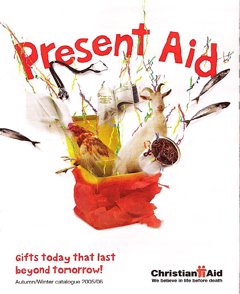
I just had to do a little piece on this Christian Aid catalogue, which is so wacky and unusual. It's an amazing collection of gift ideas, for Christmas or all-year round. There's a twist though - the gifts go to the people who need them, rather than to your friends and relatives, who will receive a Christian Aid gift card instead, with a picture to show exactly what has been bought on their behalf and how it will benefit some of the poorest people in the world.
For £30, you can buy a can of worms for Bolivian farmers to improve the soil. For only £24, a community tapstand of clean water can be installed to help prevent disease. £7 buys a vital stethoscope for Cambodian health workers and £11 provides a mosquito net for children at risk from malaria. More expensive gift ideas include: £55 for a latrine; a herd of goats to be 'revolved' from family to family for only £60; £150 to train a midwife; £370 to provide a Peruvian community with a rural library of 1000 books; earthquake-proof housing for £1,200, providing much-needed shelter for those left homeless.
You can get hold of a Present Aid catalogue by calling 0845 3300 500 during office hours. Alternatively, you can visit the Present Aid website by clicking here, and download their catalogue online.
As soon as I saw this, I knew it was a fantastic and unusual idea, so I hope that by passing it on, other people will do the same as me and send aid instead of the usual soap and socks this year.
Wednesday, October 26, 2005
is poetry just another form of therapy?
Here at last are the photos and brief account of my time at the Torbay Poetry Festival that I promised you a few days ago. I'm still not entirely recovered - too much wine, not enough sleep, etc. But at least I'm able to get back to writing now. For this relief, much thanks, as I have a deadline for the middle of next month and another 15,000 words of my novel to write.
I drove down alone in the pouring rain to Torbay, as my husband was busy with work all that weekend and couldn't join me. Luckily, I already knew quite a few people there and soon made new friends from among those I didn't know, so I didn't miss him and was actually quite glad in the end that he wasn't there. Absent cats and over-active mice spring to mind!
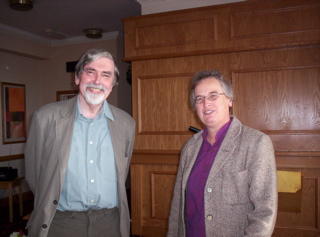
The highlight of the festival for me was the lively debate on Saturday morning between proposer Geoffrey Godbert - 'Poetry is just another form of therapy' - and Moira Clark - 'Utter nonsense!'
My sympathies lay with Moira (and not just because she was wearing a waistcoat, which took me back to my snooker-playing days). The whole idea of poetry as therapy brings me out in a rash. Needless to say, commonsense prevailed and Moira won the debate without too much difficulty: 3 votes for, 9 against, and 10 cowardly abstentions.
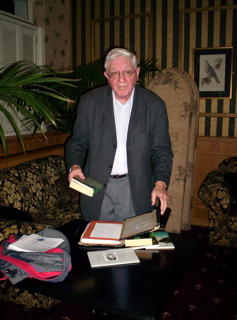
Peter Porter was the guest reader at the Festival Supper, a sumptious affair which I heartily recommend for anyone thinking of attending next year. I did writhe a little at the ticket price on booking but the poetry reading by Peter Porter was excellent and highly entertaining - time to buy his Selected, I think - and the delicious three course dinner with generous amounts of wine was clearly worth every penny. I got pleasantly drunk and sat next to a man in a banker's suit who turned out to share my love of H. Rider Haggard's more obscure novels. What better way to spend an evening than discussing the literary merits of Nada the Lily over a bottle of dry white wine and a plate of raspberry pavlova?
I shall certainly try to make next year's Festival, which felt more like a warm and relaxed family reunion than a series of disparate poetry events. William and Patricia Oxley, the key organisers, managed to run the Festival in an efficient but wonderfully informal fashion, with many other helpers giving up their time to keep things moving smoothly. Patricia, of course, is editor of the intelligent and long-running Acumen poetry magazine, based in the South-West and publishing poets from all over the world. Poetry is their life, and that sense of enthusiasm and in-depth knowledge came across at every event.

I drove down alone in the pouring rain to Torbay, as my husband was busy with work all that weekend and couldn't join me. Luckily, I already knew quite a few people there and soon made new friends from among those I didn't know, so I didn't miss him and was actually quite glad in the end that he wasn't there. Absent cats and over-active mice spring to mind!

The highlight of the festival for me was the lively debate on Saturday morning between proposer Geoffrey Godbert - 'Poetry is just another form of therapy' - and Moira Clark - 'Utter nonsense!'
My sympathies lay with Moira (and not just because she was wearing a waistcoat, which took me back to my snooker-playing days). The whole idea of poetry as therapy brings me out in a rash. Needless to say, commonsense prevailed and Moira won the debate without too much difficulty: 3 votes for, 9 against, and 10 cowardly abstentions.

Peter Porter was the guest reader at the Festival Supper, a sumptious affair which I heartily recommend for anyone thinking of attending next year. I did writhe a little at the ticket price on booking but the poetry reading by Peter Porter was excellent and highly entertaining - time to buy his Selected, I think - and the delicious three course dinner with generous amounts of wine was clearly worth every penny. I got pleasantly drunk and sat next to a man in a banker's suit who turned out to share my love of H. Rider Haggard's more obscure novels. What better way to spend an evening than discussing the literary merits of Nada the Lily over a bottle of dry white wine and a plate of raspberry pavlova?
I shall certainly try to make next year's Festival, which felt more like a warm and relaxed family reunion than a series of disparate poetry events. William and Patricia Oxley, the key organisers, managed to run the Festival in an efficient but wonderfully informal fashion, with many other helpers giving up their time to keep things moving smoothly. Patricia, of course, is editor of the intelligent and long-running Acumen poetry magazine, based in the South-West and publishing poets from all over the world. Poetry is their life, and that sense of enthusiasm and in-depth knowledge came across at every event.

Sunday, October 23, 2005
time for bed, said Zebedee
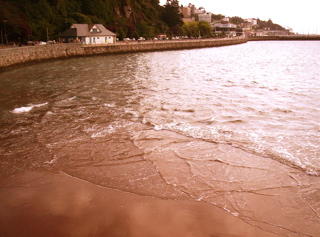
I've just returned from the Torbay Poetry Festival; here's a quick shot of the bay, taken a few hundred yards from one of the two main Festival venues, the Belgrave Hotel. Apart from the odd downpour, it was good weather for October, mild and even quite sunny on Saturday morning. I didn't need to wear a coat all weekend. I was also able to leave my car parked on the seafront for over 24 hours without getting a ticket, as there are no restrictions outside the holiday season. That proved particularly useful when I forgot my resolution not to drink too much and ended up staggering the long mile uphill to the hotel in the early hours of Saturday morning. There was a spicy beef pizza somewhere in there too, and perhaps a disagreement with a drunken Scotsman over the finer points of versification, but that story can wait for another time.
I'm still a little hung-over, if truth be told, so I won't go into too many details about the Festival itself until I've had a chance to sleep, take fluids and remember where I put my notes. Hopefully I'll manage to get some photos and text up on the blog tomorrow. Very briefly, the excellent Peter Porter was guest reader at the Festival Supper on Saturday night, there was a lively debate about poetry as therapy, and even Nelson got a look in at the Trafalgar Day readings.
Thursday, October 20, 2005
some dark little cottage
Although I should have been working, I spent an hour last night trawling through glossy brochures for British cottage holidays. Not because I want to go on holiday - what’s a holiday? - but because I’ve found that holing myself up in an isolated cottage, alone and preferably without the use of a television, helps me to write. Such isolation may not be required by people with few distractions at home - no kids, no spouse, no pets etc.. But for me, it’s a must. Once a year if I can afford it, I slope off for a long weekend or possibly a week, which is the longest I can spare away from the kids, to a tiny cottage somewhere in the most rural areas of the country. Preferably in winter when prices are cheaper and I can have an open fire in the evenings (which I love but can’t have at home because there are holes in our chimney stack and the smoke comes out horizontally instead of vertically, which fills the house with smoke).
Once installed in my dark little cottage, I tend to work until 3 or 4 in the morning most nights, sleep until about 10am, go for a walk in the crisp winter air and start work again at noon. Break for a late lunch and supper, about an hour each time. Maybe read for an hour around 11pm, to clear my head and get away from the keyboard. Then it’s back to work until my fingers hurt or I’m falling asleep over the keys.
To truly appreciate that sort of regime, I think you have to be used to living with small and/or older children, with the multiple interruptions and endless daily chores they bring - get them dressed, give them breakfast, empty the potty, wash the clothes, clean the kitchen, change the nappy, make the lunch, change the nappy again, play games, sort out the dispute over colouring pencils, mop up spillages, put on boots and coats, supervise garden playtime, wipe noses, tidy the living room, hand out Scooby snacks, handle phone calls, empty the potty, write out school permission slips, go shopping, reprogramme the telly after the baby found the remote, hang the washing out, bring the washing in, write thank-you letters and why-she-wasn’t-at-school letters to various parties, change the nappy again, read stories, make the tea, clean the kitchen, empty the potty again, get them into pyjamas etc. - all of which conspire to stop me writing or even thinking about writing for most of the day. And then I have to find time for my husband. It’s a miracle I ever get to update this blog!
I have five children, including three year old twin boys and a baby girl. I love them all dearly, and wouldn’t be without them, but some days I get up at around 6.30am with the youngest and don’t manage to start work until after lunch. Other days I don’t get to my computer until late in the evening, when the younger children are in bed and the older ones have their noses pressed to the television screen. I usually manage to write something most days, but would write a great deal more if I was secreted away in a remote cottage in the Scottish Highlands or the wilds of Cornwall for a week, with not a potty or runny nose in sight. Bliss!
Once installed in my dark little cottage, I tend to work until 3 or 4 in the morning most nights, sleep until about 10am, go for a walk in the crisp winter air and start work again at noon. Break for a late lunch and supper, about an hour each time. Maybe read for an hour around 11pm, to clear my head and get away from the keyboard. Then it’s back to work until my fingers hurt or I’m falling asleep over the keys.
To truly appreciate that sort of regime, I think you have to be used to living with small and/or older children, with the multiple interruptions and endless daily chores they bring - get them dressed, give them breakfast, empty the potty, wash the clothes, clean the kitchen, change the nappy, make the lunch, change the nappy again, play games, sort out the dispute over colouring pencils, mop up spillages, put on boots and coats, supervise garden playtime, wipe noses, tidy the living room, hand out Scooby snacks, handle phone calls, empty the potty, write out school permission slips, go shopping, reprogramme the telly after the baby found the remote, hang the washing out, bring the washing in, write thank-you letters and why-she-wasn’t-at-school letters to various parties, change the nappy again, read stories, make the tea, clean the kitchen, empty the potty again, get them into pyjamas etc. - all of which conspire to stop me writing or even thinking about writing for most of the day. And then I have to find time for my husband. It’s a miracle I ever get to update this blog!
I have five children, including three year old twin boys and a baby girl. I love them all dearly, and wouldn’t be without them, but some days I get up at around 6.30am with the youngest and don’t manage to start work until after lunch. Other days I don’t get to my computer until late in the evening, when the younger children are in bed and the older ones have their noses pressed to the television screen. I usually manage to write something most days, but would write a great deal more if I was secreted away in a remote cottage in the Scottish Highlands or the wilds of Cornwall for a week, with not a potty or runny nose in sight. Bliss!
Tuesday, October 18, 2005
goodnight
I'm utterly exhausted at the moment, so bone-tired that my eyes are trying to close even as I type this. I'm flogging myself half to death in order to complete a certain number of words on my novel before heading off to the Torbay Poetry Festival on Friday. It's odd, isn't it, how some days the words just flow, just cascade out of you, and other days you can barely look at the keyboard without wanting to retch. At the weekend, usually my most productive time, I couldn't manage more than 300 words over both days together. Yet I wrote over 2000 words yesterday, and nearly 3000 today. For no apparent reason.
I could put it down to astrological influence, of course, which is always a possibility, there being more things in heaven and earth etc., but it could also be a side-effect of having found a rhythm with this novel, like a runner 'hitting their stride'. I'm concerned, of course, that when I get back after this next weekend, my mind will be on poetry again and not prose. Which could mean disaster for this book, or it could simply inject a little grace into my prose and not affect my momentum at all. Only time will tell. Bedtime, that is. Goodnight.
I could put it down to astrological influence, of course, which is always a possibility, there being more things in heaven and earth etc., but it could also be a side-effect of having found a rhythm with this novel, like a runner 'hitting their stride'. I'm concerned, of course, that when I get back after this next weekend, my mind will be on poetry again and not prose. Which could mean disaster for this book, or it could simply inject a little grace into my prose and not affect my momentum at all. Only time will tell. Bedtime, that is. Goodnight.
Friday, October 14, 2005
typewriter
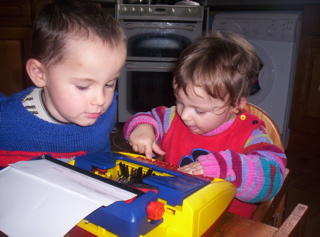
This morning I found, in a local charity shop, this old Petite typewriter for children for only £0.99p. No ribbon but the stationers across the road soon provided a reel for an adult typewriter which did the job, if a little inconsistently. The kids were delighted with it. My youngest, seen hard at work here, particularly so. Her late grandmother was a prolific best-selling novelist; there’s more than a chip off the old block in her enthusiastic typing, tip of the tongue protruding.
Watching them hammer the keys took me back to my own first typewriter, not a plastic job like this one but a bona fide too-heavy-to-move manual typewriter; a battered hand-me-down with the letter ‘s’ missing on which I wrote my first novel, a kids’ fantasy which ran to about 20,000 words, the story of a caveboy who time-travels to a present day seaside resort and is befriended by a local girl who thinks he’s French. Written from the boy’s point of view, it was a similar challenge to the one Craig Raine faced when writing his Martian poetry. How to explain the sighting of a car from the point of view of someone who has not only never seen one before, but doesn’t even understand the concept of the wheel? Then there was the memorable scene where she introduces him to the traditional fish and chip supper, eaten out of newspaper on the seafront. Fantastic. I lost the manuscript long ago but I can still remember that book in some detail, I sweated over it long enough. I would have been about twelve years old at the time.
I work on a Mac now - is there anyone out there who still uses a typewriter? - but even now, the feeling’s the same. Whenever that blank document comes up on the computer screen, I’m straight back there, at that sticky-fingered toddler stage where you just feel compelled to fill up the white spaces, to leave your mark there, to create something, anything, where there was nothing.
Wednesday, October 12, 2005
Poetry in Torbay
In just over a week’s time, I’ll be driving down to the Devon coast for the Torbay Poetry Festival. I haven’t had much time to think about it, because things have been hectic and I’m still trying to finish the novel I’ve been writing for nearly a year now. But I am looking forward to seeing some old friends at the Festival and also getting a rest from my many children. Not to mention my novel, which feels like a child some days, a monstrous uncontrollable child whom I love but can’t stand at the same time. I’ve been with it too long, I think, and need to let go.
One of the most annoying and also blessed things about writing a novel is how so many amazing ideas for other novels come to you while you’re in the midst of it all, struggling. Ideas which, at the time, appear to you like a flawless shining pearl in the darkness, beckoning you on to the bestseller list or towards the Booker Prize. All rubbish, of course, for once you begin a novel, those ideas which seemed so brilliantly luminous at the planning stages turn to dust in your hand and blow away, leaving you with nothing but the bare bones of a plot and - if you’re lucky - a good working title. Being inspired to write a 'different' novel to the one you're meant to be writing is rather like being Jesus in the wilderness, tempted with all sorts of goodies, if only you will turn away from your true path and follow evil instead. But as Jesus knew, there’s no such thing as a free lunch.
Of course the ideas that come in the midst of writing are not necessarily useless; rather, they’re like good friends who arrive unannounced while you’re busy with other things and need to be put off until another time, regretfully but firmly. So I scribble them down somewhere or create a document for them on my computer, and turn back to the novel in hand. Slowly, with gritted teeth.
While I'm away at the Festival, I may be tempted to turn a few of those ideas over in my head. But not too seriously; I will be there to hear poetry and drink wine, not to work. And my novel is not yet finished. Which means, as James N. Frey said in his hilarious book How to Write a Damn Good Novel, I need to say 'N'yet' to everything until it is.

One of the most annoying and also blessed things about writing a novel is how so many amazing ideas for other novels come to you while you’re in the midst of it all, struggling. Ideas which, at the time, appear to you like a flawless shining pearl in the darkness, beckoning you on to the bestseller list or towards the Booker Prize. All rubbish, of course, for once you begin a novel, those ideas which seemed so brilliantly luminous at the planning stages turn to dust in your hand and blow away, leaving you with nothing but the bare bones of a plot and - if you’re lucky - a good working title. Being inspired to write a 'different' novel to the one you're meant to be writing is rather like being Jesus in the wilderness, tempted with all sorts of goodies, if only you will turn away from your true path and follow evil instead. But as Jesus knew, there’s no such thing as a free lunch.
Of course the ideas that come in the midst of writing are not necessarily useless; rather, they’re like good friends who arrive unannounced while you’re busy with other things and need to be put off until another time, regretfully but firmly. So I scribble them down somewhere or create a document for them on my computer, and turn back to the novel in hand. Slowly, with gritted teeth.
While I'm away at the Festival, I may be tempted to turn a few of those ideas over in my head. But not too seriously; I will be there to hear poetry and drink wine, not to work. And my novel is not yet finished. Which means, as James N. Frey said in his hilarious book How to Write a Damn Good Novel, I need to say 'N'yet' to everything until it is.

Saturday, October 08, 2005
Aldeburgh Festival 2005
Poets at this year's Aldeburgh Festival, 4th - 6th November 2005
Carole Bromley
Julia Casterton
Kate Clanchy
Peter Cole
Russell Edson
Roy Fisher
Rhian Gallagher
Chrissie Gittins
Lorna Goodison
Donald Hall
Michael Hamburger
Jane Hirshfield
Lorraine Mariner
Adrian Mitchell
Sinéad Morrissey
Aharon Shabtai
Penelope Shuttle
Iain Sinclair
Piotr Sommer
Michael Symmons Roberts
Musician: Steve Tromans
For more details of the Aldeburgh Festival, to read the Event Guide or make a booking, click here.
Thursday, October 06, 2005
national poetry day
It's National Poetry Day. This year's theme is The Future. But right now I'm thinking more of the past. Here's today's playlist. No apologies for content.
I Try -- Macy Gray
These Foolish Things -- Billie Holiday
Something -- The Beatles
Not The Girl You Think You Are -- Crowded House
Black Coffee -- k.d. lang
My Way -- Limp Bizkit
Shiver -- Natalie Imbruglia
Brass in pocket -- The Pretenders
All the Way to Reno -- R.E.M.
Things -- Robbie Williams
My Sarah -- Thin Lizzy
America -- Simon & Garfunkel
This Used To Be My Playground -- Madonna
Memories Of East Texas -- Michelle Shocked
Left To My Own Devices -- Pet Shop Boys
Life's What You Make It -- Talk Talk
Don't Dream It's Over -- Crowded House
I Try -- Macy Gray
These Foolish Things -- Billie Holiday
Something -- The Beatles
Not The Girl You Think You Are -- Crowded House
Black Coffee -- k.d. lang
My Way -- Limp Bizkit
Shiver -- Natalie Imbruglia
Brass in pocket -- The Pretenders
All the Way to Reno -- R.E.M.
Things -- Robbie Williams
My Sarah -- Thin Lizzy
America -- Simon & Garfunkel
This Used To Be My Playground -- Madonna
Memories Of East Texas -- Michelle Shocked
Left To My Own Devices -- Pet Shop Boys
Life's What You Make It -- Talk Talk
Don't Dream It's Over -- Crowded House
Wednesday, October 05, 2005
welly and skelly
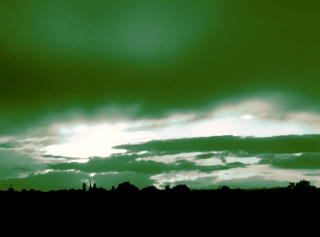
I had a fantastic time last night - shot 9-ball pool for a couple of hours, then went on to perform some of my new poetry at Night Blue Fruit at the Tin Angel in Coventry, my nearest city.
I’ve been really getting into 9-ball since going to watch a Pro Tournament on Sunday and realising how easy the game is. If the rack goes your way, that is. For instance, it seems to me that most balls will pot if you don’t welly them - as we used to say when I was playing snooker. Keep It Simple, Stupid is something to remember when playing 9-ball. And cushions are far more important than in straight pool or snooker. You have to use them on most shots, except the simplest of stuns. There’s a load of unnecessary slam-dunking goes on in 8-ball. For 9-ball, it’s cool running, easy touch, slide and glide, all pocket strength rather than welly. Not that you can’t blatter one in the far end occasionally. But even bucket pockets have been known to rattle a hard ball and spit it back out. So be aware.
Night Blue Fruit was superb, as always. The usual suspects up at the mic, a few wet-behind-the-ears readers - it’s a tough crowd for newbies!- and only one drunken heckler ejected this time, for remarking unfavourably on a poet’s genitalia. I read my new performance piece 'Night Blue Fruit at the Tin Angel', written in jaunty Skeltonics - after John Skelton, Henry VIII’s tutor and self-styled poet laureate - and got a good roar from the floor, in spite of the fact that it’s nearly 150 lines long. I didn’t have to queue for the loo once and my car was still where I’d left it by the end of the evening, with all four tyres intact. Impressive stuff.
Monday, October 03, 2005
in a net I seek to hold the wind
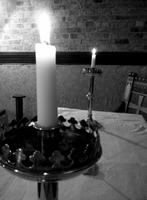 A Tudor moment, with a glance at Whoso list to hunt (whoever chooses to hunt). This sonnet by Thomas Wyatt (1503-1542) is a personal favourite of mine. It's a loose translation of Petrarch but entirely Wyatt's own, possibly written about a clandestine affair he's reputed to have had with Anne Boleyn, speaking across the centuries of frustrated love, impossible love, love at a distance. A hind, of course, is a female deer.
A Tudor moment, with a glance at Whoso list to hunt (whoever chooses to hunt). This sonnet by Thomas Wyatt (1503-1542) is a personal favourite of mine. It's a loose translation of Petrarch but entirely Wyatt's own, possibly written about a clandestine affair he's reputed to have had with Anne Boleyn, speaking across the centuries of frustrated love, impossible love, love at a distance. A hind, of course, is a female deer.Whoso list to hunt, I know where is an hind,
But as for me, alas, I may no more.
The vain travail hath wearied me so sore,
I am of them that farthest cometh behind,
Yet may I by no means my wearied mind
Draw from the deer, but as she fleeth afore
Fainting I follow. I leave off therefore
Since in a net I seek to hold the wind.
Who list to hunt, I put him out of doubt,
As well as I may spend his time in vain,
And graven with diamonds in letters plain
There is written her fair neck round about:
Noli me tangere for Caesar's I am,
And wild for to hold though I seem tame.
Noli me tangere = Do not touch me (poachers of the king's deer could expect the death penalty - as could poachers of the king's wife!)
This modern version of Whoso list to hunt comes from Hardiman Scott's edition of Wyatt's Selected Poems, which is published by Carcanet Press. Here's the back cover copy for those who'd like to know more.
Sir Thomas Wyatt (1503-1542), 'the first great English lyric poet', remains one of the most popular writer of Henry VIII's court, and the most romantic, given his entanglement with Anne Boleyn, which resulted - legend has it - in some of his most passionate and vulnerable poems. This book contains a representative selection of the work: all the best-loved poems and many lesser-known pieces which illuminate a complex and sophisticated sensibility. Hardiman Scott sees Wyatt as a modern poet before his time and demonstrates the impact he and his younger contemporary the Earl of Surrey had on the development of English poetry. Wyatt introduced the sonnet, terza rima and other Italian verse forms into English, and invented forms and processes of his own.
For those trying to remember the other much-anthologised poem by Wyatt, try this link to an online copy of his superb 'They flee from me that sometime did me seek'. More on Wyatt on this blog too, in an October 2007 entry.
Thursday, September 29, 2005
don't mention the war
A fascinating story in the news today is that of 82 year old Walter Wolfgang, a pensioner/activist expelled from the Labour Party Conference for shouting 'Nonsense!' at Foreign Secretary Jack Straw during a speech about the government's decision to go to war in Iraq. The television coverage of this small and rather frail-looking old man being forcibly dragged from his seat and removed from the Conference hall made superb television and - even though the poor man must have been terribly distressed at the time - provided some wonderful publicity for Mr Wolfgang's cause. Indeed, the pensioner looked rather triumphant today, getting his three minutes of national airtime on the topic of Iraq ... and a personal apology from various Labour bigwigs including Tony Blair himself, who admitted the stewards had been 'a little bit over-zealous'. Ah, the almost forgotten art of understatement.
Wednesday, September 28, 2005
Pool Balls and Postage Stamps
As a former world-ranked snooker player myself, I was recently amused to discover that the current U.S. Women’s Professional Pool Tour is being dominated by ex-snooker playing British pros. There are several British women playing 9-ball pool out there at the moment, including - as far as I’m aware - Allison Fisher, Karen Corr, Kelly Fisher, Kim Shaw, Sarah Ellerby and Julie Kelly. It’s true that after playing snooker, a pool table is about the size of a postage stamp. But you’d still think the Americans would triumph over British players simply by virtue of being on their own territory, playing their own game.
The British ex-snooker players – Allison Fisher in particular, aka the Duchess of Doom – seem to have been taking home the big purses from most of the official U.S. pool tournaments over the past few years, with many of the finals televised and backed by big-name sponsors. They're also making money on the side with highly lucrative exhibition matches, personal coaching and sponsorship deals, while the unfortunate American girls struggle to compete with those snooker-honed cue actions.
Perhaps I should drop the writing and fly out there, start hustling ...
The British ex-snooker players – Allison Fisher in particular, aka the Duchess of Doom – seem to have been taking home the big purses from most of the official U.S. pool tournaments over the past few years, with many of the finals televised and backed by big-name sponsors. They're also making money on the side with highly lucrative exhibition matches, personal coaching and sponsorship deals, while the unfortunate American girls struggle to compete with those snooker-honed cue actions.
Perhaps I should drop the writing and fly out there, start hustling ...
Bringing the House Down?
Poetry News: for lovers of poetry in performance and other live word events, the Bringing the House Down Festival begins this Friday in London before moving on to other British cities and Europe. Here are the details ...
Bringing the House Down
Friday 30 September, 8pm
Shaw Theatre, Novotel, 100 Euston Road, London, NW1 2AJ
Door: £8/£6 (concs)
Advance Tickets: 0870 033 2600
Email Queries
And here's the pre-tour publicity:
The Bringing the House Down Festival begins with a star-studded line up at London’s 400-seater Shaw Theatre. The night will feature the lyrical shaman, urbanspirit; international slam sensation and verbal trickster, Jive Poetic; the sassy, political Mahogany Browne; energetic mystic, Skorpio; acclaimed poet, vocal gymnast and performer, Zena Edwards; and the laid-back smoothness of former US National Slam champion Boogieman. Join us for a word feast of immeasurable proportions; poetry that fills like a six-course meal, delivered as quick as a takeaway.
For touring dates, click here. If anyone actually manages to catch the show, do leave your comments below.
Bringing the House Down
Friday 30 September, 8pm
Shaw Theatre, Novotel, 100 Euston Road, London, NW1 2AJ
Door: £8/£6 (concs)
Advance Tickets: 0870 033 2600
Email Queries
And here's the pre-tour publicity:
The Bringing the House Down Festival begins with a star-studded line up at London’s 400-seater Shaw Theatre. The night will feature the lyrical shaman, urbanspirit; international slam sensation and verbal trickster, Jive Poetic; the sassy, political Mahogany Browne; energetic mystic, Skorpio; acclaimed poet, vocal gymnast and performer, Zena Edwards; and the laid-back smoothness of former US National Slam champion Boogieman. Join us for a word feast of immeasurable proportions; poetry that fills like a six-course meal, delivered as quick as a takeaway.
For touring dates, click here. If anyone actually manages to catch the show, do leave your comments below.
Tuesday, September 27, 2005
Last Chance for Blast-Off!
I've just had an email from the Poetry Society, reminding me that tomorrow is the last day for voting on which poem should be blasted off into space. Choose from their selection or suggest your own choice.
To visit the Poetry Society site and place your vote, click here.
To visit the Poetry Society site and place your vote, click here.
Saturday, September 24, 2005
online poetry school
I've just found a useful link on the Poetry Society home page to the new online Poetry School, which offers workshops, courses, special events and other support to new or improving writers. This is what they say about themselves ...
The Poetry School was founded in 1997 by three poets - Mimi Khalvati, Jane Duran and Pascale Petit - to teach poetry to adults. We offer a comprehensive range of courses and workshops exploring key elements of poetic practice, complemented by stimulating lectures, discussions and seminars with some of the most renowned poets working today.
The School started life in London and continues to flourish there. Our courses take place in a variety of venues round the city from pubs to galleries, architects’ practices to Quaker meeting houses. As the School has grown, we have established teaching centres in Exeter, Manchester and York, and also offer activities in Aldeburgh, Bath, Dorchester, Ledbury, Lewes, Newcastle-upon-Tyne, Northumberland and Winchester.
The website seems very professional and the list of tutors features many high-profile poets. It might be worth a browse if you're hoping to improve your work to publication standard or just wish to find out more about contemporary poetry. One of the special events in particular caught my eye; trips around London to visit the haunts of famous poets like John Donne, T.S. Eliot, Ted Hughes and Sylvia Plath, presumably also looking at the impact of place on their poetry. Sounds fascinating. Click here for more details.
The Poetry School
The Poetry School was founded in 1997 by three poets - Mimi Khalvati, Jane Duran and Pascale Petit - to teach poetry to adults. We offer a comprehensive range of courses and workshops exploring key elements of poetic practice, complemented by stimulating lectures, discussions and seminars with some of the most renowned poets working today.
The School started life in London and continues to flourish there. Our courses take place in a variety of venues round the city from pubs to galleries, architects’ practices to Quaker meeting houses. As the School has grown, we have established teaching centres in Exeter, Manchester and York, and also offer activities in Aldeburgh, Bath, Dorchester, Ledbury, Lewes, Newcastle-upon-Tyne, Northumberland and Winchester.
The website seems very professional and the list of tutors features many high-profile poets. It might be worth a browse if you're hoping to improve your work to publication standard or just wish to find out more about contemporary poetry. One of the special events in particular caught my eye; trips around London to visit the haunts of famous poets like John Donne, T.S. Eliot, Ted Hughes and Sylvia Plath, presumably also looking at the impact of place on their poetry. Sounds fascinating. Click here for more details.
Tuesday, September 20, 2005
first poem in space
This year's theme for National Poetry Day is The Future, so the Poetry Society have been encouraging people to vote online for one of a shortlist of contemporary poems to be sent into space as representative of earth's poetry. No foreign language poets in this selection, I note, even in translation. But you may love the shortlist, so go, look, read, cast your vote. It's also possible to nominate a poem not on the list, so if none of the poems on offer fire your rockets, you can still make your personal choice known. I'm not sure when the deadline is for voting, but the winning poem will presumably be announced on October 6th, National Poetry Day.
though a glass, darkly

This afternoon, after hideous complications during the morning had frazzled my nerves, I waited for what felt like an eternity behind a teenage girl at a cash dispenser only for her to be joined by another teenage girl who promptly got out her own card. I snapped at them both in terms which would be familiar to a sailor and stomped off without even waiting for her to finish. Then, in an area of my local library which is intended for under-5s, I was trying to control my various tiny and rather noisy offspring when a child of about eight years old approached me in a superior manner and asked if I could possibly keep my children quiet. I asked, in return, if she would like a poke in the eye. She went off without pressing the point any further, but watched me cautiously for the next half hour as though I were mad. Which I probably was, at that moment. And then I had to come home and continue writing the novel which I had so magnificently failed to write during the day. Happy times ...
Saturday, September 17, 2005
the emperor's new clothes
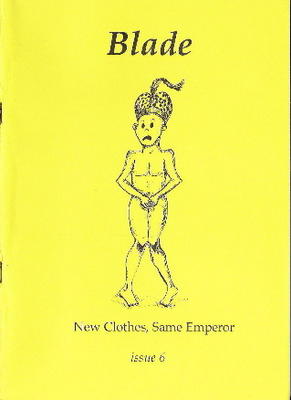
BLADE 6: The Emperor’s New Clothes Summer 1997
It’s been a while since I was closely involved in the small press scene, so I’ve been trawling the net with considerable interest over the past few months, looking at which poetry magazines are still afloat and which have folded, which have sprung up out of nowhere and which have changed hands or allegiances, as well as spotting various names of poets who were promising newcomers a few years ago and are now regulars on the festival circuit or celebrating their first - or even second! - full-length collections.
I took time out from poetry to start a new family, which I don’t regret, but I feel that the ground shifted while I wasn’t looking, that the view is no longer the same. Or perhaps it wasn’t the ground that shifted, but me; poetry is the same-old, same-old. I’m the one who has changed.
Blade was my creation, a critical poetry magazine that came out of a desire to get my hands dirty and my name known at the same time. It ran to nine issues. Looking back at its demise, I know that I screwed up, that things went seriously wrong and I handled the situation badly. I should have taken a step back, maybe let someone else edit the magazine for a few issues while I sorted my head out, but I was exhausted and pissed off, and the person doing the administration side of things went awol towards the end - the only thing that wasn’t my fault! - which meant subscribers’ and contributors’ addresses disappeared into the ether along with the bank balance, and I decided enough was enough. So Blade never made it to Issue Ten.
People were disappointed. That was inevitable and difficult for me to handle. It was a time I remember with little fondness, being a sort of King Lear moment in my life where I teetered on the brink of madness and was only saved by the few people I still had around me - my oldest friends and my family.
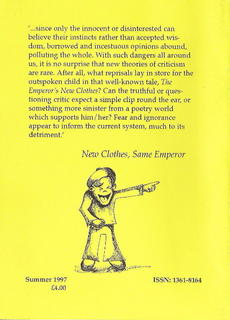
BLADE 6: Back Cover. Click on the image to enlarge.
In spite of those problems, I’m still proud of what I achieved with Blade in its heyday. It was forthright and challenging and bold for its time.
I produced the entire first issue myself - hand-printing, collating and stapling 100 copies of a 44 page magazine with a card cover. After that, I gave up the home-made look and it went to the printers. But Issue One is still one of my favourites, a little over-enthusiastic and naive though it may seem in retrospect, but featuring some marvellous poems by Brendan Kennelly, Martin Stannard, Geoff Hattersley, Maura Dooley, Mario Petrucci and Amanda Dalton, amongst many other talented poets. Not bad for a first issue edited from the Isle of Man by a complete novice.
Wednesday, September 14, 2005
shameless
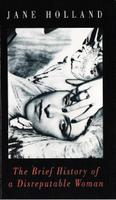
I recently bought a scanner-cum-photocopier-cum-printer and have been playing with it this morning, scanning in various things that I needed on my computer. Which gives me an opportunity for a shameless plug. The above cover is from my first collection of poetry which can be ordered online from the likes of amazon.
I was fortunate enough to win an Eric Gregory Award from the Society of Authors before I hit thirty and was too old to qualify. When I was called in for my interview, they picked one particular poem out of the bunch I'd submitted and asked 'What made you write this poem?' Too terrified to lie, I was honest. 'I needed 30 poems for the submission. I only had 29, so I sat down and banged that one out on the typewriter, put it straight into the envelope and posted them all off.'
That poem, Spin Cycle, was the only one of my early poems which made it into my first collection with Bloodaxe. I just wish 'banging them out' still worked that well ...
SPIN CYCLE
(for Becky)
You’ve been blackberrying again.
I take your blouse
and watch it turn
through the white suds
in the drum, rinse-hold,
spinning slowly through the cycle.
I hear you up above,
bouncing on the bed
to reach the oval mirror,
see the purple stains
around your mouth and chin,
blackness under nails
and in your hair.
Soon, like your swan-necked sister,
you will not have to stretch
on tiptoe for the sink
or grip the rail
when coming down the stairs.
You say ‘When?’
I do not have the answers.
Just the slow loop
of your blouse
growing heavy with water,
as one cycle ends
and waits upon another.
Monday, September 12, 2005
daddy-long-legs

I wrote a poem yesterday about daddy-long-legs. Crane flies, in other words. The countryside is alive with them at this time of year; just hanging the washing out, hundreds sprang up out of the grass as I approached, taking to the air with their strange faery-like wings and those long legs splayed out like sky-divers'. And I can't open the windows at night in case they come in, hordes of them, flickering around the lights and getting in my hair, so the kitchen gets steamed up and I lose my temper, scooping the annoying little insects up and throwing them out of the door whenever I get the chance. It seems they are everywhere this year. It felt a little Hughesian to be writing about crane flies; there's something mythical about them, perhaps even nightmarish when they come into the house in such numbers, that they seem to fit perfectly into Ted Hughes' vision of the natural world. Besides, I've just found his poem A Cranefly in September, from Season Songs, with its astonishing description of her 'jointed bamboo fuselage', so accurately observed. But still, these are Warwickshire craneflies. Practically a different species.
Sunday, September 11, 2005
john skelton & night blue fruit at the tin angel

"For though my ryme be ragged,
Tattered and jagged,
Rudely rayne beaten,
Rusty and moughte eaten,
It hath in it some pyth."
I recently discovered a poetry performance venue in Coventry, called Night Blue Fruit and hosted by the Heaventree Press. It's essentially an open mic evening at the Tin Angel - a small and intimate bar on Medieval Spon Street in old Coventry - and something about the night's atmosphere kicked me back into revisiting John Skelton's work, who was a self-styled poet laureate back in the days of Henry VIII. I was thinking of one of his poems in particular, the gloriously scurrilous and jaunty Elinour Rumming, a poem of some 620 short lines dealing with the landlady and clientele of a disreputable Tudor ale house.
All through the evening at Night Blue Fruit, through the windows of the Tin Angel, we could see girls in high heels, short skirts, low-cut tops etc., out on the razzle, some of them drunk, others grazing on chips and kebabs in between night clubs. They would yell at each other, laugh as they staggered across the road for a taxi, while inside the Tin Angel the poetry continued to flow. By the time I got home there was a long poem brewing away inside me, a modern-day Elinour Rumming about poets and drunken girls and the English language ... though, of course, these things never work out the way you envisage them.
I sat up well into the early hours to finish it; a dangerous policy when you've had a few drinks. But the poem was still halfway decent in the morning, which is a good sign that you haven't entirely wasted your time. I've tinkered with it since, cut some sections which weren't working, and inserted some additional sections which came into my head later. Naturally, it's a performance piece rather than what some might call a traditional poem. But would Skelton have considered that there was a difference between the two?
Over the centuries, many critics have dismissed poems like Elinour Rumming as not lyrical enough to be taken seriously or accepted into the mainstream. But I think their energy and the dynamic challenges such poems pose to the English language more than make up for a lack of formalism. That's what Skelton was about, after all; keeping English on its toes, constantly shocking and surprising us with what it can do when stretched and subverted. Some of his work is so modern, experimental and tongue-in-cheek that it's difficult to remember it was written in the late fifteenth and early sixteenth century.
Here's the beginning of Skelton's famous satirical epic Phyllyp Sparowe, parodying the Offices for the Dead:
Pla ce bo,
Who is there, who?
Di le xi,
Dame Margery;
Fa, re, my, my,
Wherfore and why, why?
For the sowle of Philip Sparowe,
That was late slayn at Carowe,
Among the Nones Blake,
For that swete soules sake,
And for all sparowes soules,
Set in our bedrolles,
Pater noster qui,
With an Ave Mari,
And with the corner of a Crede,
The more shallbe your mede.
Whan I remember agayn
How mi Philyp was slayn,
Never half the payne
Was betwene you twayne,
Pyramus and Thesbe,
As than befell to me:
I wept and I wayled,
The tears downe hayled;
But nothing it avayled
To call Phylyp agayne,
Whom Gyb our cat hath slayne ...
Subscribe to:
Posts (Atom)

